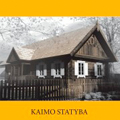Would you like to encounter an intruder in your bedroom?
Picture this: you’re sound asleep in your home, and suddenly you sense that there’s an intruder. You’d be scared to death, wouldn’t you? That’s exactly what happens to the bats wintering here. In the winter, this tunnel becomes the home – or more precisely, the bedroom – for thousands of bats. An unsolicited guest who wakes them up from a deep sleep can also become their killer. A bat awakened by dust, noise, light, or even human body heat may have the fat it has accumulated for winter depleted and may not live to see the spring. We have built this barrier to keep such intruders out. After all, hanging out in a stranger’s bedroom in the dark is pretty weird, right?
Several species of bats spend the winter in the High Paneriai railway tunnel, including the rare, endangered pond bats that are protected throughout Europe. How many of them, and other species of bats, spend their winters hanging in the tunnel upside down? In 2000, there were about a hundred of bats recorded here. However, with the designation of the tunnel as an important habitat protection area in 2004 and the appearance of the barrier, the “bedroom” has become safer, with the number of bats increasing every year. In the winter of 2021, there were about 1,900 sleepy bats in here!
Since there are so many of them, will your innocent walk through the tunnel really hurt these animals? Unfortunately, yes. Bats hibernate at the most constant temperature possible, sinking into a deep sleep and reducing their body temperature to 5-10℃. Without food and by using their stored energy resources, they can hibernate for 5-7 months. However, people visiting such a place can wake the bat up with the light of a flashlight, the echo of their footsteps or even the heat of their body. After waking up, the bat will try to flee to a safer place and this uses up a lot of the energy stored for hibernation. In the winter, bats cannot find food (mosquitoes, flies and other insects), so a human-awakened bat will frequently die.
Think about it – is it worth condemning another creature to a slow death just to satisfy your curiosity and enjoy a brief moment of entertainment?

















